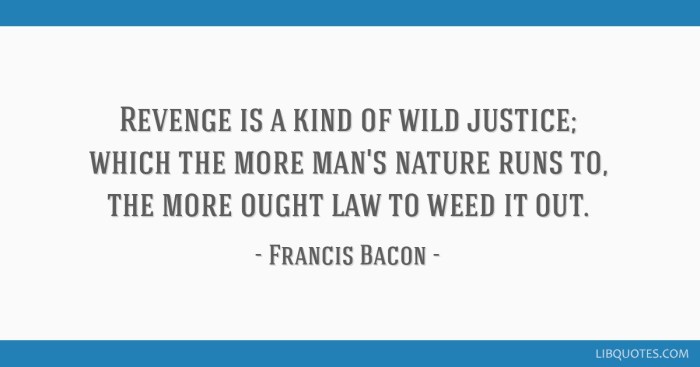Quotes about revenge in Frankenstein delve into the novel’s intricate themes and character dynamics, offering profound insights into the destructive nature of vengeance and its corrupting influence.
The novel’s characters grapple with the consequences of their actions, revealing the complexities of revenge and its far-reaching impact on both the perpetrator and the victim.
Quotes about Revenge in Frankenstein
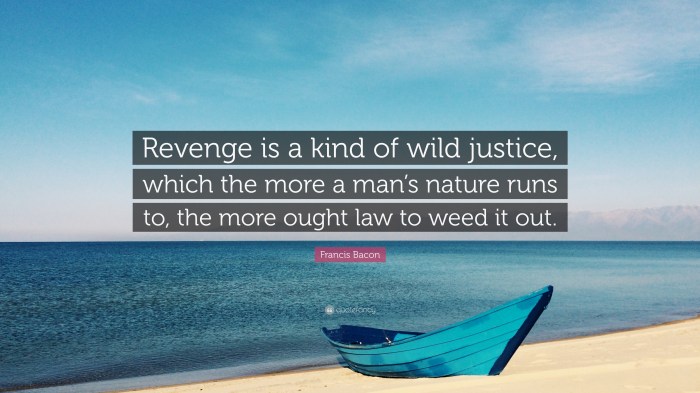
The theme of revenge is a central motif in Mary Shelley’s Frankenstein. Both Victor Frankenstein and his creation, the Creature, are driven by a desire for vengeance, leading to tragic consequences.
Victor Frankenstein’s Quote
Victor Frankenstein’s quote, “I believed myself destined for some great enterprise. My feelings are profound, but I possessed a coolness of judgment that fitted me for illustrious achievements,” reveals his hubris and ambition. He believes himself to be superior to others and destined for greatness.
This arrogance blinds him to the potential consequences of his actions, ultimately leading to the creation of the Creature and his own downfall.
The Creature’s Quote
The Creature’s quote, “My heart yearned to be known and loved by these amiable creatures, and I believed that where I found kindness, I should find safety and happiness,” highlights his desire for acceptance and companionship. However, his grotesque appearance and the rejection he faces from society drive him to seek revenge against his creator and all of humanity.
The Creature’s Statement
The Creature’s statement, “Cursed, cursed creator! Why did I live? Why, in that instant, did I not extinguish the spark of existence which you had so wantonly bestowed?” expresses his anguish and despair. He curses Frankenstein for creating him and condemning him to a life of misery and isolation.
The Creature’s words convey the profound psychological and emotional damage inflicted upon him by his creator’s actions.
Themes of Revenge in Frankenstein
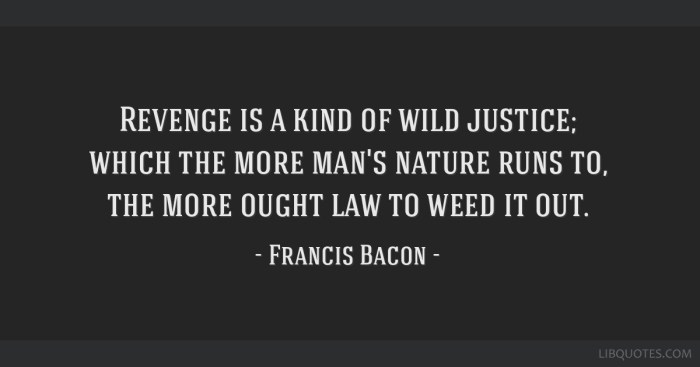
Revenge is a central theme in Mary Shelley’s Frankenstein, explored through the characters of Victor Frankenstein and his creation, the Creature. Shelley presents revenge as a destructive force that corrupts individuals and perpetuates a cycle of violence.
Revenge as a Destructive Force
Victor Frankenstein’s relentless pursuit of the Creature after it murders his brother, William, consumes him and ultimately leads to his downfall. His obsession with revenge blinds him to the consequences of his actions, driving him to abandon his family and friends and neglect his responsibilities.
Revenge as a Corrupting Influence
The Creature’s transformation from a gentle and innocent being to a vengeful monster is a direct result of Frankenstein’s rejection and cruelty. The Creature’s desire for revenge corrupts his nature, leading him to commit acts of violence against Frankenstein and his loved ones.
Revenge as a Cycle of Violence
The conflict between Frankenstein and the Creature escalates into a cycle of violence that ultimately destroys both of them. Frankenstein’s initial act of creating the Creature sets in motion a chain of events that leads to the deaths of William, Justine Moritz, and Elizabeth Lavenza.
The Creature’s revenge against Frankenstein culminates in the destruction of both the creator and his creation.
Historical and Literary Context of Revenge in Frankenstein: Quotes About Revenge In Frankenstein
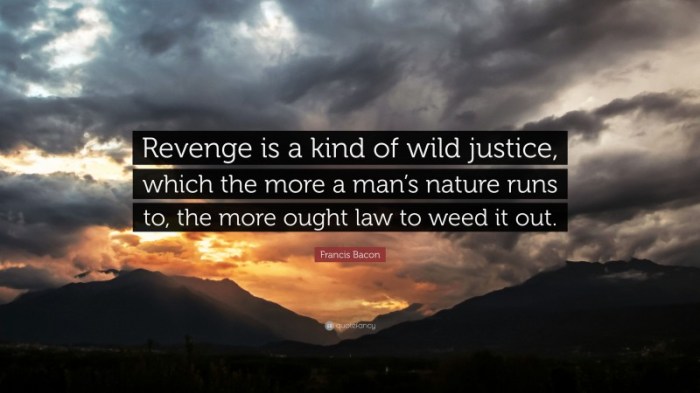
The theme of revenge is prevalent in Gothic literature and Romantic poetry, reflecting the cultural preoccupation with retribution and justice during the late 18th and early 19th centuries. In Gothic literature, revenge often manifests as a supernatural force, driving characters to seek vengeance for perceived wrongs.
Romantic poetry, on the other hand, explores the psychological and emotional consequences of revenge, emphasizing its corrosive effects on the individual.
Comparison to Other Works
Frankenstein’s portrayal of revenge is unique compared to other works of the time period. In Shakespeare’s Hamlet, revenge is a central theme, driving the protagonist’s actions and leading to a tragic outcome. Similarly, in Milton’s Paradise Lost, Satan’s desire for revenge against God motivates his actions and ultimately results in his downfall.
However, in Frankenstein, the theme of revenge is more complex and nuanced. Victor Frankenstein’s pursuit of revenge against the creature he created is ultimately self-destructive, as it leads to his own downfall and the destruction of those he loves.
Influence of Enlightenment Ideas
The Enlightenment’s emphasis on reason and individual rights influenced the concept of revenge in Frankenstein. The Enlightenment thinkers believed that revenge was a primitive and irrational emotion that had no place in a civilized society. They argued that justice should be administered through the legal system, rather than through personal vengeance.
Frankenstein’s pursuit of revenge is seen as a violation of these Enlightenment ideals, as he takes the law into his own hands and ultimately brings about his own destruction.
Artistic Interpretations of Revenge in Frankenstein
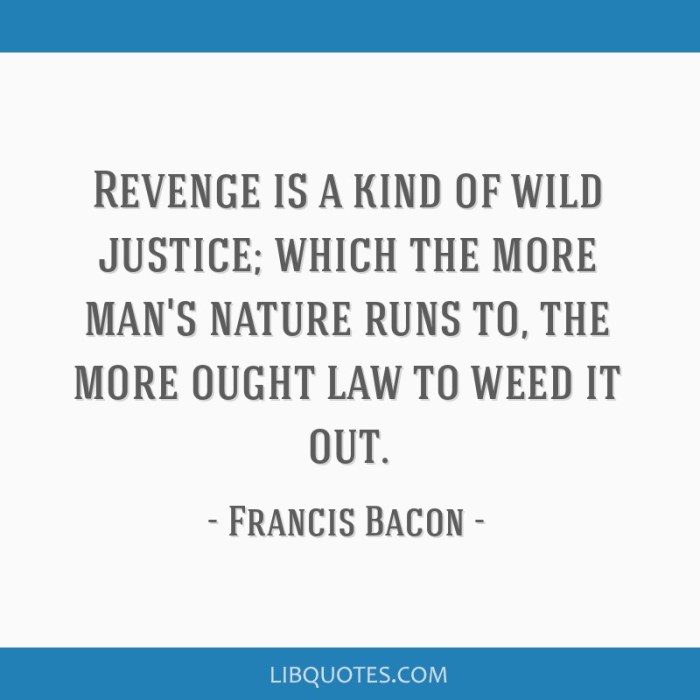
Revenge has been a central theme in numerous adaptations of Frankenstein, spanning various artistic mediums. These adaptations have interpreted the themes and characters associated with revenge in the novel in diverse ways, reflecting the cultural and historical contexts in which they were created.
Film Adaptations
Film adaptations of Frankenstein have often emphasized the psychological and emotional aspects of revenge. James Whale’s 1931 classic depicts the Creature as a sympathetic figure driven by a desire for revenge against his creator. In contrast, Kenneth Branagh’s 1994 adaptation portrays the Creature as a more monstrous and vengeful entity, seeking retribution for his abandonment.
Theater Adaptations, Quotes about revenge in frankenstein
Theater adaptations of Frankenstein have explored the ethical and philosophical implications of revenge. Nick Dear’s 1994 play, “Frankenstein,” focuses on the Creature’s struggle to understand the nature of good and evil, while Harold Bloom’s 1997 adaptation, “In the Heart of the World,” examines the destructive consequences of unchecked revenge.
Graphic Novels
Graphic novels have provided a unique visual medium for exploring revenge in Frankenstein. Bernie Wrightson’s 1983 graphic novel, “Frankenstein,” depicts the Creature as a grotesque and terrifying figure, driven by an insatiable thirst for vengeance. In contrast, Neil Gaiman’s 2014 graphic novel, “The Sandman: Overture,” presents a more nuanced and empathetic portrayal of the Creature, exploring the psychological and emotional complexities of his desire for revenge.
Impact of Cultural and Historical Context
The artistic interpretations of revenge in Frankenstein have been shaped by the cultural and historical contexts in which they were created. The Romantic era, in which the novel was written, emphasized the importance of emotion and the individual, leading to sympathetic portrayals of the Creature in early adaptations.
The rise of Gothic literature in the 19th century contributed to the more monstrous and vengeful depictions of the Creature in later adaptations.
Quick FAQs
What is the significance of Victor Frankenstein’s quote about his “great enterprise”?
This quote reveals Victor’s hubris and his belief in his own superiority, which ultimately leads to his downfall.
How does the Creature’s desire for love and acceptance foreshadow his later actions?
The Creature’s longing for companionship and understanding is met with rejection and cruelty, which fuels his anger and desire for revenge.
What is the symbolic meaning of the Creature’s statement about extinguishing the “spark of existence”?
This statement reflects the Creature’s despair and his desire to end his own suffering, as well as his anger towards Victor for creating him.
